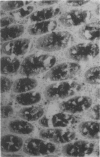Abstract
Two murine Mabs VA1(IgG1) and VA2(IgG1) were produced against a bacterial fusion protein comprising glutathione S-transferase and five tandem repeats of the MUC1 protein. Using the immunoperoxidase staining technique, VA1 detected 46/53 and VA2 detected 48/53 breast cancers and both also reacted with a range of other human epithelial carcinomas. In addition VA1 gave weak reactions with normal breast tissues whereas VA2 was non-reactive and could be a relatively tumour specific antibody for breast cancer. The antibodies were also tested by ELISA-VA1 reacted weakly with glycosylated HMFG but strongly with deglycosylated HMFG, whereas VA2 reacted strongly with both forms of HMFG. The reactivities of the two Mabs with synthetic peptides of the MUC1 tandem repeat were used to map the epitopes recognised by VA1 (amino acids RPAPGS) and VA2 (amino acids DTRPA). The use of fusion proteins provides another means of immunisation to produce anti-tumour antibodies.
Full text
PDF
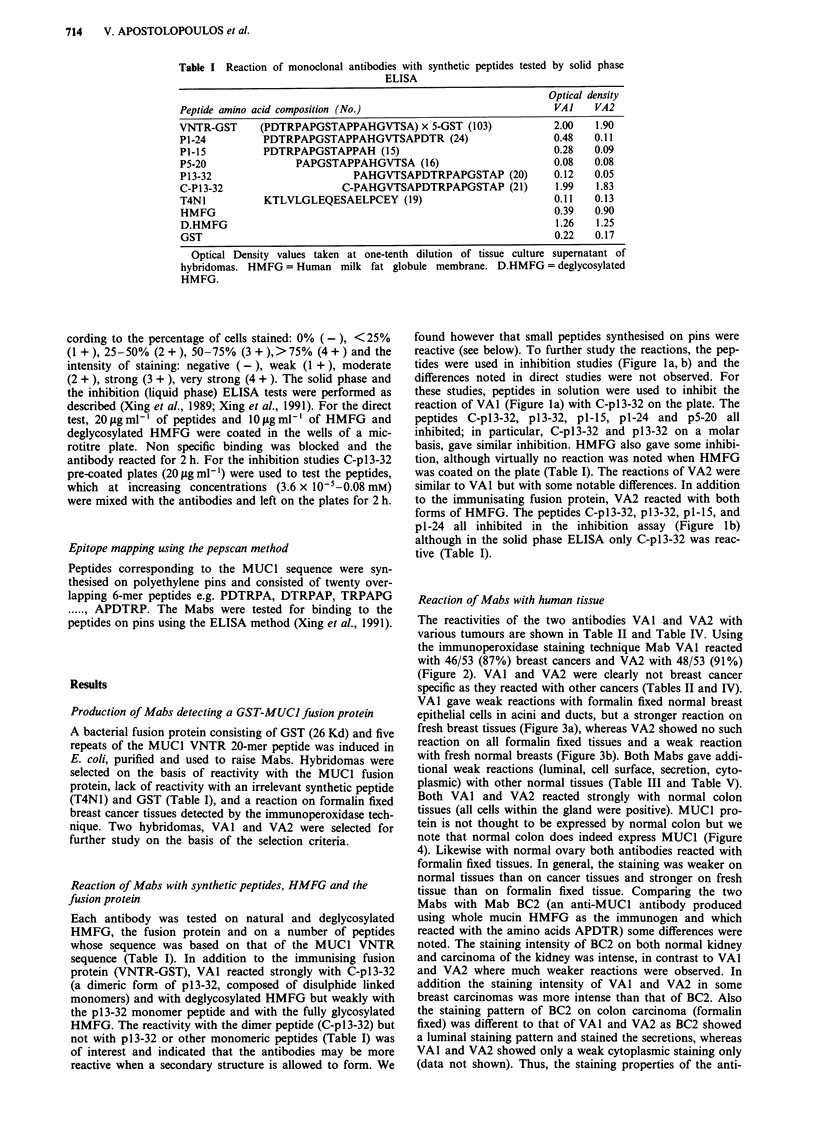
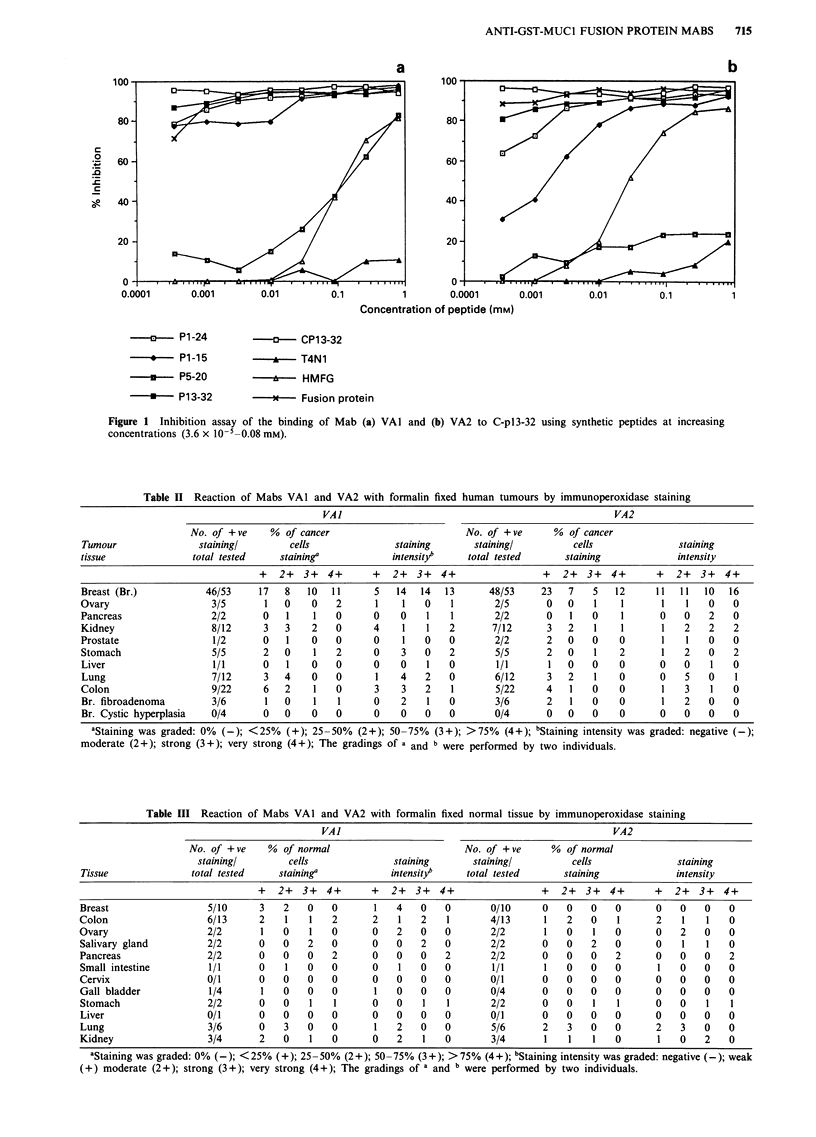


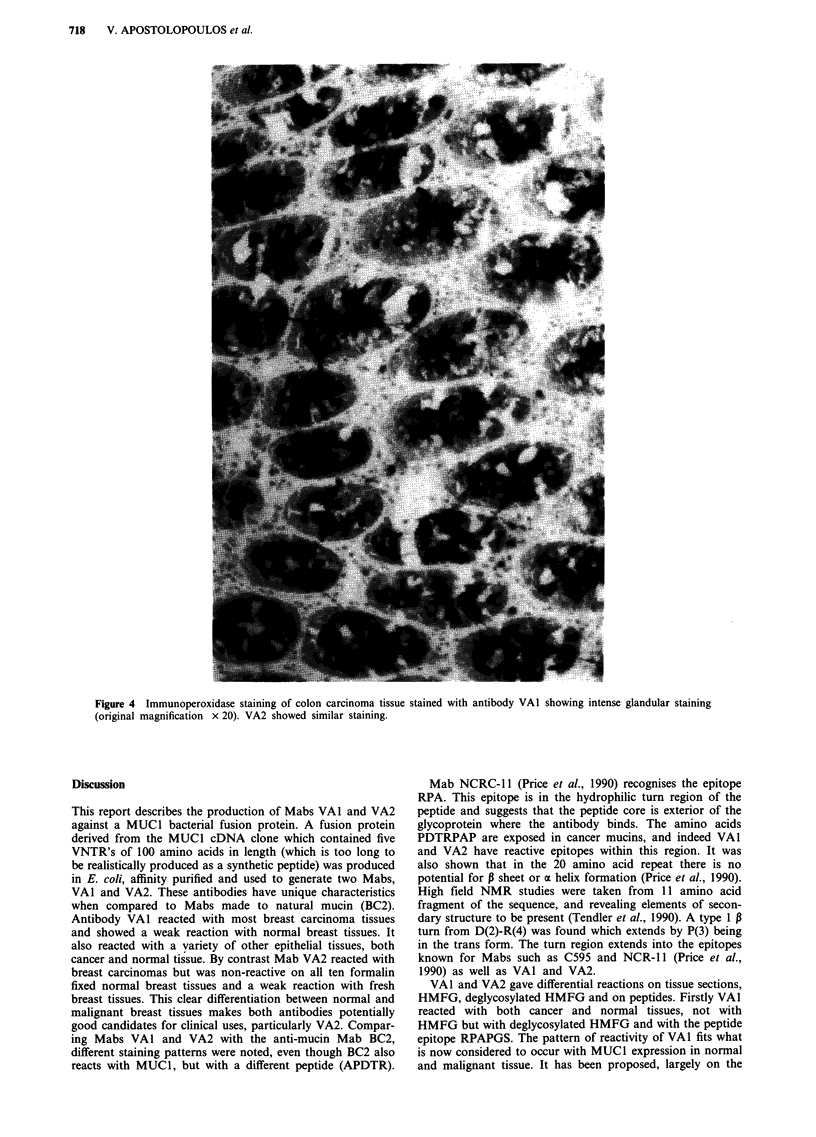
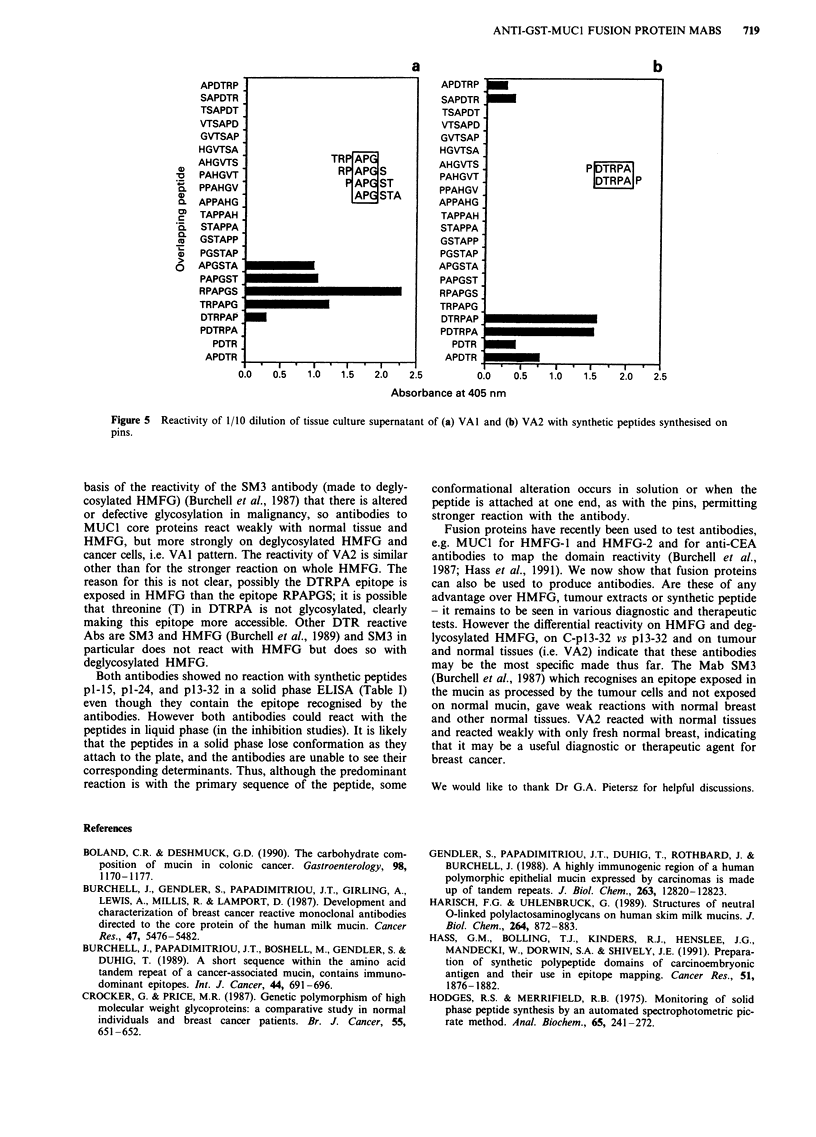

Images in this article
Selected References
These references are in PubMed. This may not be the complete list of references from this article.
- Boland C. R., Deshmukh G. D. The carbohydrate composition of mucin in colonic cancer. Gastroenterology. 1990 May;98(5 Pt 1):1170–1177. doi: 10.1016/0016-5085(90)90330-4. [DOI] [PubMed] [Google Scholar]
- Burchell J., Gendler S., Taylor-Papadimitriou J., Girling A., Lewis A., Millis R., Lamport D. Development and characterization of breast cancer reactive monoclonal antibodies directed to the core protein of the human milk mucin. Cancer Res. 1987 Oct 15;47(20):5476–5482. [PubMed] [Google Scholar]
- Burchell J., Taylor-Papadimitriou J., Boshell M., Gendler S., Duhig T. A short sequence, within the amino acid tandem repeat of a cancer-associated mucin, contains immunodominant epitopes. Int J Cancer. 1989 Oct 15;44(4):691–696. doi: 10.1002/ijc.2910440423. [DOI] [PubMed] [Google Scholar]
- Crocker G., Price M. R. Genetic polymorphism of high molecular weight urinary glycoproteins: a comparative study in normal individuals and breast cancer patients. Br J Cancer. 1987 Jun;55(6):651–652. doi: 10.1038/bjc.1987.132. [DOI] [PMC free article] [PubMed] [Google Scholar]
- Gendler S., Taylor-Papadimitriou J., Duhig T., Rothbard J., Burchell J. A highly immunogenic region of a human polymorphic epithelial mucin expressed by carcinomas is made up of tandem repeats. J Biol Chem. 1988 Sep 15;263(26):12820–12823. [PubMed] [Google Scholar]
- Hanisch F. G., Uhlenbruck G., Peter-Katalinic J., Egge H., Dabrowski J., Dabrowski U. Structures of neutral O-linked polylactosaminoglycans on human skim milk mucins. A novel type of linearly extended poly-N-acetyllactosamine backbones with Gal beta(1-4)GlcNAc beta(1-6) repeating units. J Biol Chem. 1989 Jan 15;264(2):872–883. [PubMed] [Google Scholar]
- Hass G. M., Bolling T. J., Kinders R. J., Henslee J. G., Mandecki W., Dorwin S. A., Shively J. E. Preparation of synthetic polypeptide domains of carcinoembryonic antigen and their use in epitope mapping. Cancer Res. 1991 Apr 1;51(7):1876–1882. [PubMed] [Google Scholar]
- Hodges R. S., Merrifield R. B. Monitoring of solid phase peptide synthesis by an automated spectrophotometric picrate method. Anal Biochem. 1975 May 12;65(1-2):241–272. doi: 10.1016/0003-2697(75)90509-6. [DOI] [PubMed] [Google Scholar]
- Ligtenberg M. J., Vos H. L., Gennissen A. M., Hilkens J. Episialin, a carcinoma-associated mucin, is generated by a polymorphic gene encoding splice variants with alternative amino termini. J Biol Chem. 1990 Apr 5;265(10):5573–5578. [PubMed] [Google Scholar]
- Price M. R., Hudecz F., O'Sullivan C., Baldwin R. W., Edwards P. M., Tendler S. J. Immunological and structural features of the protein core of human polymorphic epithelial mucin. Mol Immunol. 1990 Aug;27(8):795–802. doi: 10.1016/0161-5890(90)90089-i. [DOI] [PubMed] [Google Scholar]
- Siddiqui J., Abe M., Hayes D., Shani E., Yunis E., Kufe D. Isolation and sequencing of a cDNA coding for the human DF3 breast carcinoma-associated antigen. Proc Natl Acad Sci U S A. 1988 Apr;85(7):2320–2323. doi: 10.1073/pnas.85.7.2320. [DOI] [PMC free article] [PubMed] [Google Scholar]
- Smith D. B., Johnson K. S. Single-step purification of polypeptides expressed in Escherichia coli as fusions with glutathione S-transferase. Gene. 1988 Jul 15;67(1):31–40. doi: 10.1016/0378-1119(88)90005-4. [DOI] [PubMed] [Google Scholar]
- Stacker S. A., Thompson C., Riglar C., McKenzie I. F. A new breast carcinoma antigen defined by a monoclonal antibody. J Natl Cancer Inst. 1985 Nov;75(5):801–811. doi: 10.1093/jnci/75.5.801. [DOI] [PubMed] [Google Scholar]
- Tendler S. J. Elements of secondary structure in a human epithelial mucin core peptide fragment. Biochem J. 1990 May 1;267(3):733–737. doi: 10.1042/bj2670733. [DOI] [PMC free article] [PubMed] [Google Scholar]
- Thompson C. H., Jones S. L., Whitehead R. H., McKenzie I. F. A human breast tissue-associated antigen detected by a monoclonal antibody. J Natl Cancer Inst. 1983 Mar;70(3):409–419. [PubMed] [Google Scholar]
- Xing P. X., Prenzoska J., Quelch K., McKenzie I. F. Second generation anti-MUC1 peptide monoclonal antibodies. Cancer Res. 1992 Apr 15;52(8):2310–2317. [PubMed] [Google Scholar]
- Xing P. X., Reynolds K., Pietersz G. A., McKenzie I. F. Effect of variations in peptide sequence on anti-human milk fat globule membrane antibody reactions. Immunology. 1991 Feb;72(2):304–311. [PMC free article] [PubMed] [Google Scholar]
- Xing P. X., Tjandra J. J., Stacker S. A., Teh J. G., Thompson C. H., McLaughlin P. J., McKenzie I. F. Monoclonal antibodies reactive with mucin expressed in breast cancer. Immunol Cell Biol. 1989 Jun;67(Pt 3):183–195. doi: 10.1038/icb.1989.29. [DOI] [PubMed] [Google Scholar]





